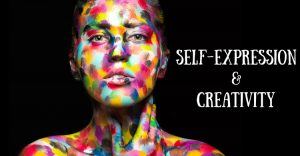 Some feelings are hard to verbalize. Some thoughts we don’t want to say out loud. So what do we do with them? My thoughts and feelings used to drive me to get high. I had learned that drugs could change how I felt, whether it was dampening my anger or invigorating my boredom. But, that change was always only temporary.
Some feelings are hard to verbalize. Some thoughts we don’t want to say out loud. So what do we do with them? My thoughts and feelings used to drive me to get high. I had learned that drugs could change how I felt, whether it was dampening my anger or invigorating my boredom. But, that change was always only temporary.
Now that I’m living a life in recovery, I still deal with impulsive thoughts and overwhelming feelings, but I find a way to manage them by expressing them. Self-expression sounded like a lot of “Dear Diary” nonsense to me, but the creative arts are an amazing outlet for our recovery.
We can write our thoughts down privately into journals, stories and poems. But, we can go beyond words and express through paintings, drawings, doodles, and photographs. We can express through music, dance, and song. Self-expression involves any activity where we can transfer the energy from our thoughts and feelings into another form. And, usually, this makes us feel better.
Self-Expression
When we express our feelings honestly, we are better equipped to deal with them because we actually know what we are feeling instead of denying it. A UCLA neuroscientist, Alex Korb, has even conducted experiments that show how the brain can benefit when we express ourselves. In an fMRI study, participants viewed pictures of people with emotional facial expressions. Then, their amygdala—the part of the brain that plays a primary role in our emotional reactions—activated to the emotions in the picture. Yet, when a participant named the emotion, it reduced the amygdala’s reactivity and lessened the impact of the emotion. The study even found that when we try to suppress our negative emotions, our inward stress and anxiety can get more intense!
By virtue of being human, we are full of thoughts and ideas that inhabit us with energy. And if the creative energy in our mind sits untouched, it can turn on itself and we feel all sorts of anxiety and restlessness. To maintain our emotional well-being, we need to exercise our creativity.
Flow
The therapeutic benefits of artistic activities come in many forms: hands-on tasks can soothe our minds, they offer a healthy form of escape, and such tasks can free up our unconscious minds. Coloring books geared towards adults have gained popularity recently, and they are marketed as therapeutic tools. When we get into a state of creative “flow,” our minds enter an optimal state of consciousness where we feel and perform our best. Our concentration is so focused that everything else falls away, and we lose our sense of time and self.
Normally, our brain is in a fast-moving state of beta waves. In flow, our brainwaves slow to an alpha state, the same as our day-dreaming and meditation mode, where we slip from thought to thought easily. Our prefrontal cortex is also temporarily deactivated, which allows us to simply create without self-consciousness or judgment. Making time to use your brain creatively can bring your brain and body the same kind of benefits as meditation: practicing mindfulness and decreasing anxiety.
Arts and Healing
Art and health have been a subject of human interest throughout our history as a species, using pictures, stories, dances, and chants as healing rituals. In a hospital setting, studies have found that clinical outcomes improve more in patients who participate in art therapy than in those who do not. Creative expression may be a catalyst in our emotional healing process.
Expressive writing has been particularly successful in long-term improvements of mood and health. Writing about our emotional states can bring us more self-awareness, but studies have also shown that it helps us manage those emotions and cope with them.
When the intent behind our art is self-expression, the value in the art becomes the emotional benefits. The process we go through to create our art, to transform a mental image into something physical, is a reflection of our thought processes. How many times in a day do you stop to consider what or how you are feeling? Much like paying attention to how we feel physically, the creative arts allow us to check in with our mental well-being and emotional state.
The Power of Creativity
Expressive arts bridge the gap between the conscious and unconscious mind. When we put our mental process into a physical form, we feel more in control of our thoughts and feelings, and we understand them more clearly. We can’t always explain an emotion using logic. Creative activities allow us to externalize our thought process and observe it from a distance, and then we don’t have to act on our feelings impulsively.
The creative and artistic processes allow us to merge our emotional and our logical parts into one identity. This is a key step in our healing—to learn that what we think logically may not match how we feel, and that’s okay. It is a part of our process. Having a creative outlet where we can express ourselves means we can better manage those thoughts and feelings.
Nadia Sheikh is a content writer and web developer for Sober Nation.
Have you tried creative expression, either as a way to manage thoughts or as a “Vital Absorbing Creative Interest?” If so, have you found it helpful?
